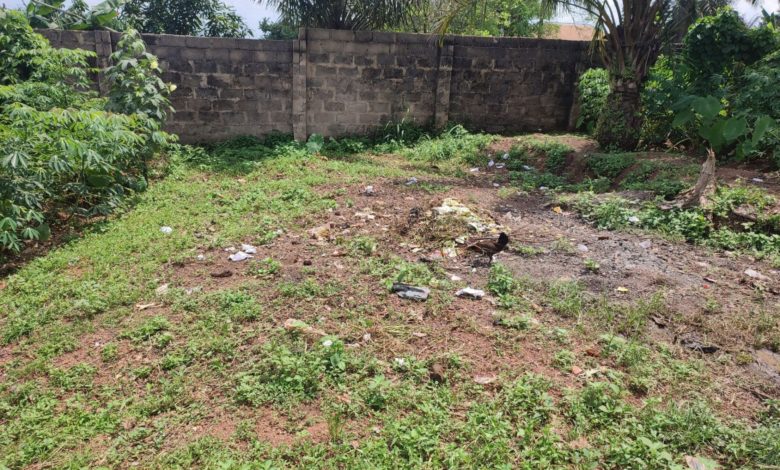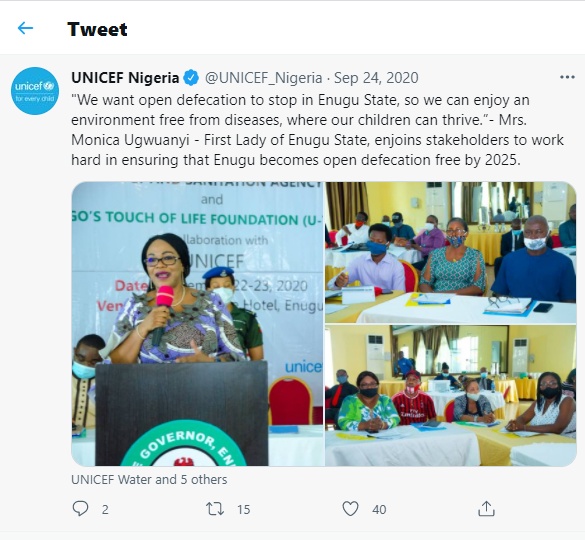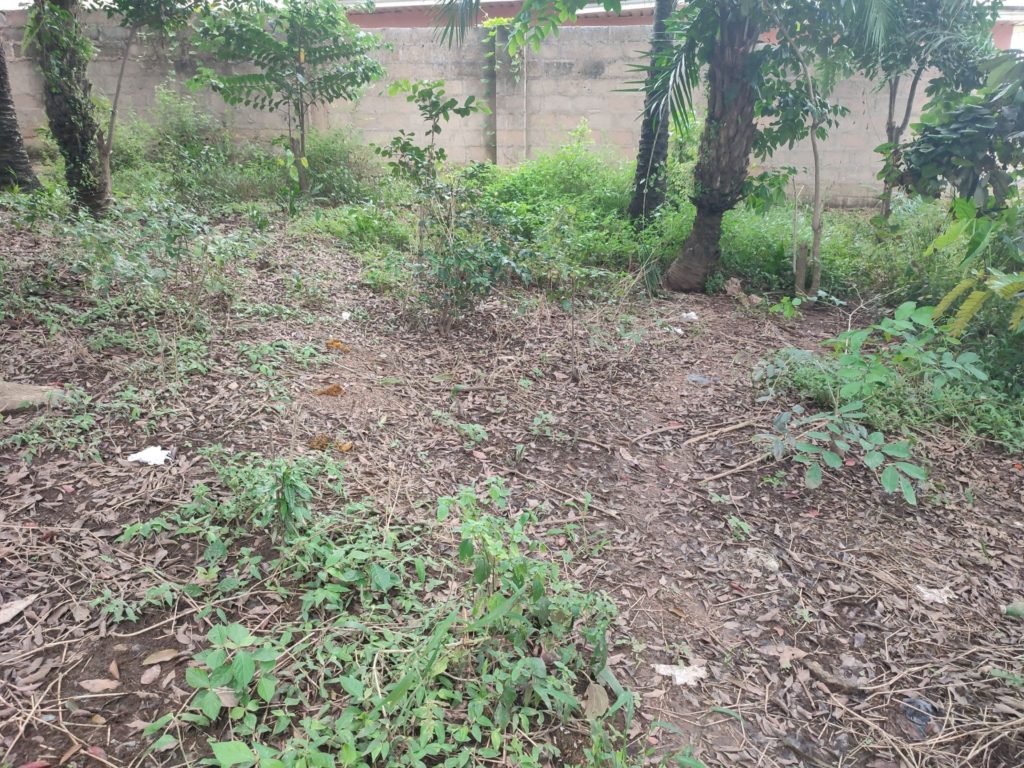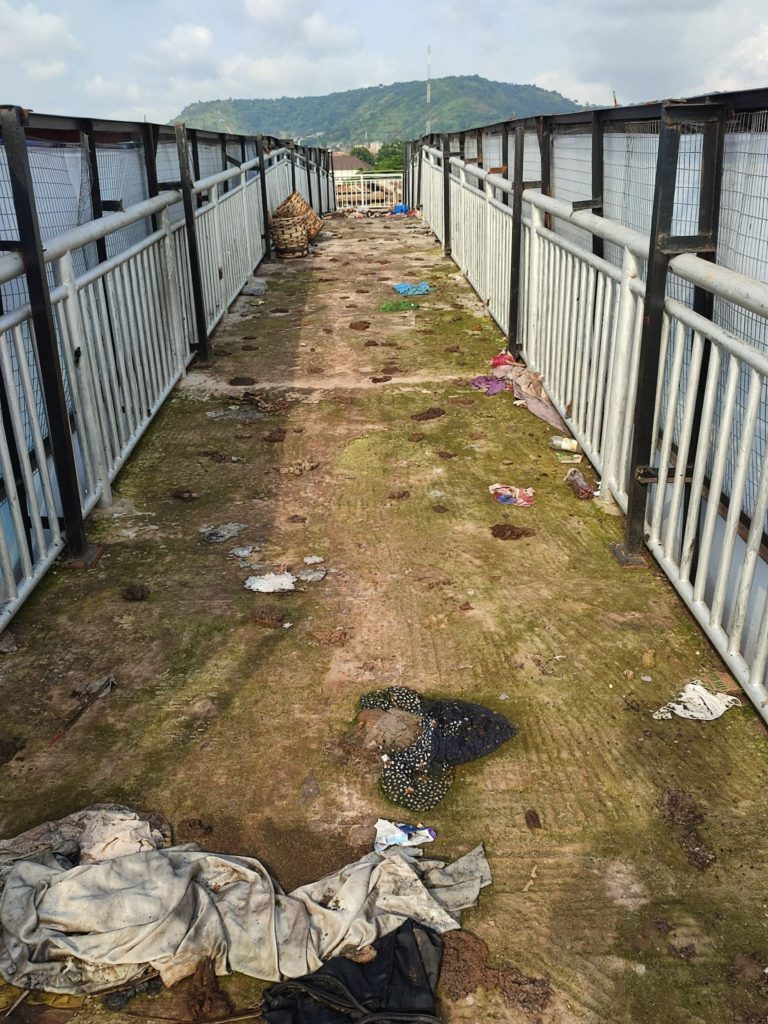Delay In Execution Of Public Toilets Project Threatening Public Health In Enugu
With less than two years to go, it is unlikely that the current administration in Enugu State, Southeast Nigeria will execute a N1.2 billion public toilet project in the state.

As the sun heats up at melting temperature, James Chinedu experiences a rumble in his bowel. Chinedu knew that the stomach upset would not go unless he emptied his bowel. With one hand holding the stomach and the other on his trousers, he ran into a nearby bush and defecated. Once he was relieved, Chinedu got up, zipped up his trousers and went his way, leaving flies to celebrate his deposit on the mother soil.
Each time Chinedu is pressed to defecate, he has a spot along the railway track near Ogbete, the major market in Enugu State, Southeast Nigeria where he answers the call of nature.

“This has been my regular spot for years now because I don’t have any toilet facilities in my compound,” he said without blinking an eye. But he is not the only one who has converted the railtrack to their public toilet, several other people in the neighbourhood and passers-by also often rush there to relieve themselves there.
“Many people who live around and those who use the track when returning home also defecate here.”
Chinedu is just one among 47 million Nigerians who lack access to proper sanitation facilities in their homes and have had to embrace open defecation practice, which health experts say is a precursor to many health hazards, especially for women and children.
Open defecation in Enugu
In both urban and rural areas in Enugu State like New Artisan market, Ogbete, Umuegwu in Isi Uzo, some parts of Abakpa and Garki, it is common to see children and adults make their way to nearby bushes, railway tracks, street gutters, and open water bodies to defecate.
Obinna Sunday, a resident of Abakpa said he does not have toilet facilities in the compound where he lives or around his house and as such, defecating openly becomes the only option he has each time he needs to defecate.
For thousands of people living in slums and informal settlements with very poor sanitary conditions, the use of plastic bags dubbed as ‘flying toilets’ is common.
A global Water Sanitation and Hygiene (WASH NORM) survey, conducted by the United Nations Children’s Fund (UNICEF), shows that only India ranked worse than Nigeria in open defecation.
A 2018 National Outcome Routine Mapping (NORM) Report, showed that in addition to the 47 million Nigerians who did not have toilets and another 75 million who were using unimproved toilet facilities, the country loses N455 billion (US$ 1.3b) annually due to poor sanitation.
Currently, there are only 27 out of the 774 local government areas in Nigeria that have attained open defecation-free status, with Bauchi, Benue, Cross River and Jigawa States leading the drive.
Nigerian President, Muhammadu Buhari, had in 2019 signed an Executive Order 009 to tackle open defecation, a move described by health experts and environmentalists as a good one. Following the Executive Order, the country’s Ministry of Water Resources¸ the UNICEF and some other key agencies, launched the initiative tagged ‘Nigeria Open-Defecation-Free By 2025: A National Road Map’ in order to end the inimical practice by 2025.
Health implications
Several reports and studies have described open defecation as one of the biggest public health concerns in developing nations. Globally, over 700 children die daily from diarrhoea caused by unsafe water, sanitation, and poor hygiene.
In July, the Enugu State Ministry of Health confirmed a cholera outbreak in New Artisan Market, Enugu, which resulted in the death of seven people with 19 persons identified with the symptoms of loose stool and vomiting.
Confirming the outbreak, State Commissioner for Health, Emmanuel Obi, disclosed that the ministry’s rapid response team, upon receiving reports of the incident, carried out an immediate investigation and “it was observed that the patients presented with sudden onset of passage of loose stool and vomiting.”

He added that the ill persons identified within the area were immediately and safely evacuated to the hospital while health education on safe and hygienic practices were given to the inhabitants of the market.
The commissioner linked the outbreak to poor sanitation and contaminated water, arising from open defecation practice which has been found to be prevalent in the market.
It is estimated that 159 million children worldwide under the age of five are stunted as a result of open defecation which remains one of the leading devastating menaces to public health in Nigeria.
UNICEF estimates that about 122,000 Nigerians, including 87,000 children under the age of five, die every year from diarrhoea, intestinal worm infections and other preventable sanitation-related illnesses. Some two million children die each year from such illnesses globally.
Mary Nnaji, in her mid thirties, with four children, recalled one of the occasions when one of her sons suddenly started stooling. It was in early Jan. 2021. When she discovered what was happening, she quickly rushed him to a hospital in Isi Uzo, where she lives with her family.
“When we got to the hospital, the doctor examined him and said it was diarrhoea and that it was the kind of water we were taking,” she said. “He gave us medication which calmed the situation down.”
Nnaji told this reporter how she and her family have been drinking water from Amanyi- one of the streams in her community, where children and adults defecate each time they are pressed, making the stream unsafe for human consumption.
While over 673 million people still practice open defecation, an estimated 367 million children attend a school with no sanitation facility at all.
Prevalence of open defecation and the lack of adequate sanitation hardware is also known to have strong and disproportionate gender-based impacts because it renders girls and young women vulnerable to sexual violence, which frustrates efforts for them to lead a healthy and productive life.
As there are no private lavatory facilities for women, they are often forced to relieve themselves in public places at dawn or late at night, when the likelihood of sexual assault or violence is higher.
Enugu earmarked N1.2 billion for public conveniences
In Dec. 2019, Enugu State Government earmarked the sum of N1 billion in its 2020 budget for the construction of public conveniences across the three senatorial districts in the state.
David Ugwunta, State Commissioner for Budget and Planning, while giving the breakdown of the budget, said the decision to construct conveniences was in keeping with the resolve of the Nigerian Government to end open defecation by 2025.
But the decision by the state government to set aside as much as N1 billion for the construction of conveniences did not go down well with critics who felt it was one of the strategies of the government to steal public funds.
Expectedly, almost two years after the project was mooted and the budget was passed, it is yet to be implemented, giving rise to the suspicion that the government was not genuinely interested in ending open defecation.


In its 2021 budget, the state government again earmarked an additional N200 million for the same purpose: “the construction of public conveniences to enhance sanitation and hygiene across the state,” thus bringing the total amount budgeted to N1.2billion.
When asked during the budget breakdown why an additional fund was being set aside for a project that had been budgeted for but was not implemented, Ugwunta said plans were still underway.
No location for project execution
Despite the huge budgetary allocation, the State Government did not indicate in both the 2020 and 2021 budget documents, the locations for the construction of the public conveniences, which were among the outstanding projects.
Igboke Onyebuchi, Project Manager, Advocacy Partnership for Good Governance, a civil society organisation expressed concerns that the state government was yet to commence the construction of the public conveniences it had budgeted for even in the second quarter of 2021, when the life of the administration is less than two years.
“It is difficult for people to locate where these projects are sited because it was indicated in the budget,” Onyebuchi said. “The government only said they were going to construct public conveniences to end open defecation.”
He said the state government was supposed to partner with various local governments- together with the economic planning commission of the state- in the implementation of the projects.
“The state government needs to expedite action towards the implementation of the project which is a welcome development if they want the people to continue to trust them,” he said.
Onyebuchi also noted that beyond erecting sanitation structures or providing clean and safe toilets, the government must do well to change people’s behaviour from choosing farm fields, railways, motor parks, stadiums, highways, streets, roads, playgrounds, bushes, forests and water bodies, to using the toilets and always maintain the structures.
Pedestrian crossing bridge turn open defecation spot
The failure of the government to commence the construction of the public toilets and absence of any in Enugu metropolis has continued to encourage residents to take advantage of public utilities as toilets.

Nearly one year after the pedestrian crossing bridge, Ogbete main market, Enugu was completed, pedestrians are yet to start using them to cross to either side of the road.
The Enugu State Ministry of Works had in June, 2020, come out to say that the pedestrian bridge was safe for public use on completion.
The ministry was reacting to what it described as “a mischievous and false graphic illustration of crack” on the pedestrian crossing bridge which had gone viral on social media.
It said that rather than a crack, what was present was a designed construction joint at mid span pier which is applicable to other similar bridges. “There are no structural defects from the stair flights through the landings to the beams, and down through the piers to the foundation,” the ministry had said in a statement.
Rather than use it for the purpose for which it was meant, the bridge has become a safe and comfortable spot for open defecation. At night and even during the day, residents are seen climbing the bridge and defecating on it.
The presence of an advertising billboard which makes it hard to see anyone on top of the bridge makes it more comfortable for those involved in the act.
SDG goal 6 becoming a mirage
It remains to be seen if the prevalence of open defecation in Enugu and other states in Nigeria will lead to the attainment of the Sustainable Development Goal (SDG) on Water Sanitation and Hygiene by 2030.
Goal 6.2 of the SDG stipulates that by 2030, governments should achieve access to adequate and equitable sanitation and hygiene for all, and end open defecation, paying special attention to the needs of women and girls and those in vulnerable situations.
At a workshop for the development of the state’s roadmap for the attainment of the ‘Open Defecation Free (ODF)’ goal by 2025, Ifeanyi Ugwuanyi, Governor of Enugu State said the practise of open defecation was not good for the health, education, and socio-economic life of the people.
The Governor said the state had signed up to the national Partnership for Expanded Water Supply, Sanitation and Hygiene (PEWASH) strategy–a national collaboration for a multi-sector partnership designed to provide opportunities for the water and sanitation sector to leverage expertise, technology and financial resources from all levels of government, development partners, private sector, civil society and community, to improve the sector.
For Nigeria to be open defecation-free, the World Bank said about N2.88 trillion ($8.3 billion) needs to be invested.
Works commissioner says project yet to commence
Greg Nnaji, the Commissioner for Works and Infrastructure in the state, said that the project was a joint venture that is being handled by the Ministry of Environment and the Ministry of Works in the state.
He confirmed that the project had not commenced as he had lost touch with it. “The Ministry of Environment is the originator, “he said. “The Works Ministry only comes in when it is time to execute the project.”
On Thursday, Sept, 9, this reporter sent a message to Chijioke Edeoga, the Commissioner for Environment in the state on whether or not the state had commenced construction of the public conveniences that were captured in the budgets for 2020 and 2021. But he did not reply or respond to the messages sent to his mobile phone and did not return calls to his phone.
Support Our Journalism
There are millions of ordinary people affected by conflict in Africa whose stories are missing in the mainstream media. HumAngle is determined to tell those challenging and under-reported stories, hoping that the people impacted by these conflicts will find the safety and security they deserve.
To ensure that we continue to provide public service coverage, we have a small favour to ask you. We want you to be part of our journalistic endeavour by contributing a token to us.
Your donation will further promote a robust, free, and independent media.
Donate HereStay Closer To The Stories That Matter




